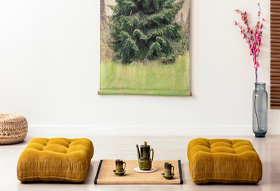
Foam for Floor Cushions

The UK market has an indescribable love for home furnishings, notably in the form of sofas and armchairs. However, as more people are looking to de-clutter their living spaces and many continue to live in small apartments in big cities, there is a rising demand for floor cushions in favour of bulkier items of furniture such as sofas.
Furthermore, floor cushions are praised as being an excellent option for those wanting to provide additional seating for guests or would like to create a more informal living space. Even in neat spaces, the use of floor cushions solves the ‘look but don’t touch’ experience one may feel when entering a home. Informal, portable and most of all comfortable, floor cushions are available in at a range of price points. However, this also means they often vary in quality.
Some individuals invest in floor cushions to provide a soft seating space in children’s playrooms. Both soft and safe, the inner materials and outer fabrics can be appropriately tailored to children’s tastes. With their portable nature, these same cushions can be moved to other areas within the home, such as the living room where they can be placed next to a coffee table for children to sit down and colour in. The possibilities are endless – even more so when you create your own floor cushion.

Common inner materials used for floor cushions include feather and fibre fill. However, both of these materials aren’t the best when wanting to keep the floor cushions in a maintained, structured shape. Due to the soft nature of these materials, floor cushions made with feather or other fibre filling will likely not be as supportive. Some feather cushions are available with a high quantity of stuffing, though these can come at considerable cost.
A better alternative – and one that is far easier to work with when creating a DIY floor cushion – is foam. There are a significant number of grades, types and thicknesses to choose from, meaning that your floor cushion can be customised to your exact requirements. Should you wish to create a floor cushion with a rigid, strong structure, we recommend high-density polyurethane foam, though if you would prefer the cushion to be a little softer, medium and high density reflex foams are also an excellent choice. For children’s cushions, medium-high density is also the recommended option.

With eFoam, it is easy to find a foam insert that is cut to your exact requirements. To order, use our online ‘cut to size’ calculator and simply enter the dimensions of your desired shape – width, depth and height. Should you wish to order a custom shape, you can contact one of our friendly representatives who can guide you through the process.
There are a number of suitable materials you may wish to consider for your floor cushion – tufted corduroy, woven rush, crushed velvet, etc. When measuring the material, remember to allow for an extra inch and a half on each dimension to movement of the fabric when the foam filling is inserted. Remember - a small amount of fabric will also be taken up by stitched seams and zips when constructing your cushion.
Should you wish to receive expert advice on appropriate foam for floor cushions, please contact us.

